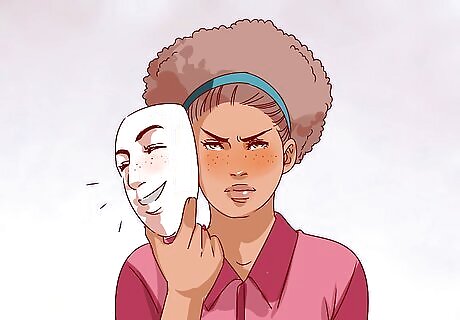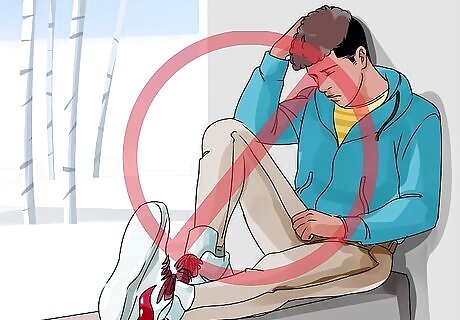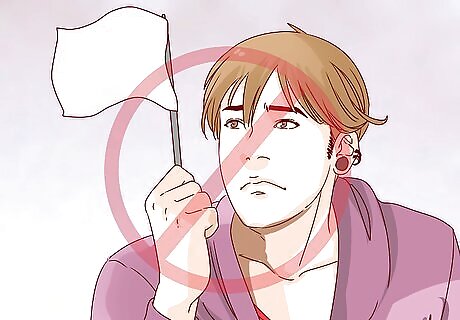
views
Working Through Your Emotions

Put it in perspective. Maybe you didn't get the lead, but is your part really that bad? Think of all the good things about your role that none of the other parts have. Maybe you get to be in one of the best songs, or you get to have the best costume. Consider the things about this part that will make you happy in the long run.

Get in touch with your emotions. It can really hurt if you didn't get the part you wanted. Have a good cry. Talk with somebody you trust. If you express your emotions instead of bottling them up, it will be easier to move on.

Talk to somebody else who is disappointed with their part. Even better, talk to someone who has done this play before and has gotten your exact part, if possible. Ask them how they felt. Maybe they can tell you some of the perks of having this role. All in all, this can usually make you feel a lot better.

Remember that it's okay to be angry. Sometimes you'll be mad at your director. Don't think that's petty or childish - that's normal. Get your anger out by punching something or writing it out. Don't stay angry or hold a grudge for very long - that will make your situation worse.

Go through the script. Look at the songs. Highlight your lines to see how many you have. You might be surprised by your role in the end - it might not be as small as you originally thought.

Don't dwell on it. If you spend hours sulking about the bad aspects of your part, you will not enjoy being part of the play at all. You'll never get over it, and that won't be good. Your director will likely not want you to be in their cast again, and you won't be a fun cast member to practice lines with. Take some time for yourself to get your feelings out, and then move on.

Think about why your director may have cast you in your specific role. Don't immediately assume that it's because you're a bad singer or actor with no talent. Maybe it was because your personality matched the part you were given better than the part you tried out for. More likely, it was because there were so many talented people trying out for the best parts - including you - and it was one of the most difficult decisions the director had to make. Maybe they knew they couldn't put all the less talented people in the chorus or ensemble and wanted somebody good to help carry the voices. Don't assume it was for a bad reason.

Talk to your director. Ask them why they cast you in your role. Don't sound petty, and don't sound like you're complaining. Don't get angry and say something like, "Why didn't you give me a better part? I was the most talented person trying out and you know it!" Stay strong. Don't cry or yell. Make sure you have a calm tone of voice. Simply ask, "I know there were a lot of really talented people trying out for [insert the part you wanted], but I thought I would get something a little bit better than the part I got. Of course I know that you couldn't put everybody as the lead, but I just wanted to know why." Listen to them when they explain. If they ask you questions, answer them - in your same calm tone of voice. They will give you a good, fair explanations, and all your questions will be answered. Most likely, you will leave feeling better than you did before.
Playing a Different Part

Don't quit the play. It may be tempting, but don't make any rash decisions. Think seriously about whether or not you want to quit. Consider the fact that even if your part is small, they need somebody to play it. All parts are necessary to the play. If you quit, it's going to be really hard for everybody. The director will have to scramble to find somebody to replace you, or have to change the entire play if they can't find anybody at all. It may be hurtful to know that you got a bad part, but don't just give up. Stick with the play if you can. More than likely you will find yourself having a great time anyway, despite your role. The only situation in which you should quit is if you find yourself beginning to hate your director. If you can't look them in the eye without wanting to cry, and you can't do your part wholeheartedly, then you should talk to them about quitting the play. But in most situations, you shouldn't have to do this.

Play your role with a heart. Give it your all. Practice your lines over and over again, just like everybody else. Sing your songs all the time. Do your absolute best in rehearsal. If you show your director that you can act even the smallest of roles with gusto and all the talent you can possibly muster, it will show them that you are a serious actor that won't succumb to setbacks. It will also show them that you aren't a sore loser - you're a team player all the way. And if you show them those things, they'll probably give you a better part next time.

Get to know people in the cast with parts like yours. Run lines with them. Practice your songs with them. They can even be people to talk to and complain to about your parts - they can definitely relate because they'll be in the exact same situation as you! It'll definitely be easier than talking to the lead about your part. So try to strike up a conversation with them. You might even end up making some really close friends.

On opening night, give yourself a pep talk. Know that you should be proud of yourself for working hard like everybody else and always looking on the bright side, even though you didn't get the part you wanted. All in all, this will have been a good experience for you. Think of it as a life lesson. It will definitely help you when you do other productions in the future.



















Comments
0 comment